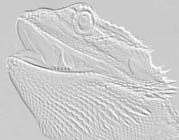 |
 |
|||
 |
||||
| Try our new Dosage Calculator. You can download the file here by clicking on it and saving it to your computer. The file is virus safe as I created it myself. It is an Excel file, so you will need Microsoft Excel to open it. If you have any problems opening it, please email me and I will gladly email you the file. If someone knows how to make a Flash Dosage Calculator, please let me know! | ||||
| Home
treatment presents its own problems and concerns, one of which is calculating
an incorrect dosage. Too little and the medicine is ineffective, and on
the other hand, too much and your Beardie could suffer an overdose, which
might cure the disease but end up killing the sick Dragon. Please be very
careful when calculating dosages. Always double check your work, and if
your're not sure, ask your vet. If you do decide to use the do-it-yourself
approach, here are some guides to help you calculate drug dosages.
A dose is the amount of medicine to be administered at one time. It is often expressed in terms of milligrams (mg) of medicine to be given per kilogram (kg) of body weight. There are four things that you must know when medicating your Beardie: 1. The accurate weight of your Beardie converted to kilograms. 2. The concentration of medicine being used. 3. The interval between doses. 4. The duration of treatment. Although this sounds complicated, there is a simple formula you can use to arrive at the exact single dosage for the Beardie that you want to treat. Weight The first step is to convert the weight of your Dragon to kilograms. You will probably measure the weight in grams or ounces. Convert grams to kilograms by dividing by 1000 or moving the decimal 3 places to the left. For example: 350 grams is .35 kilograms. Concentration The second step is to understand how strong the medicine is that you are using. This is known as the concentration and is usually expressed in mg/ml (milligrams per milliliter) and should be clearly written on the bottle. Occasionally, the concentration may be stated in mg/cc (milligrams per cubic centimeter), but ml and cc are different names for the same unit of measurement. This is important to know because while most bottles are marked in ml's, most syringes used to administer the actual dose are marked in cc's. If a concentration is stated in a percentage, multiply the percent by 10 to get the concentration in mg/ml. For example: Baytril comes as 2.27% solution. Multiply 2.27 by 10, and you get a concentration of 22.7 mg/ml. Dosage Recommended drug dosages for reptiles medicines are available from your veterinarian or can be found in published reference manuals. To calculate the correct dosage, multiply the dose times the weight of the Beardie and divide by the concentration. Dose (x) weight in kg's(/) concentration. Example: Dose = 22 mg/kg, weight = .35 kg, concentration = 50 mg/ml..... 22 x .35 / 50 = 0.15 cc's.
Common measurement conversions: 1000 grams = 1 kilogram 28 grams = 1 ounce 454 grams = 1 pound 1 pound = 0.454 kilograms 2.2 pounds = 1 kilogram |
||||
| This information should be used only as a reference tool and should not be used in place of vet assistance. My views and opinions are the result of hours of dedicated research. But remember, I am not a professional. If you have a sick beardie and don't know what to do, don't play God, take him to the vet immediately. | ||||
|
Copyright
© Beautiful Dragons. All Rights Reserved.
This website may not be copied or reproduced without my permission. |
||||